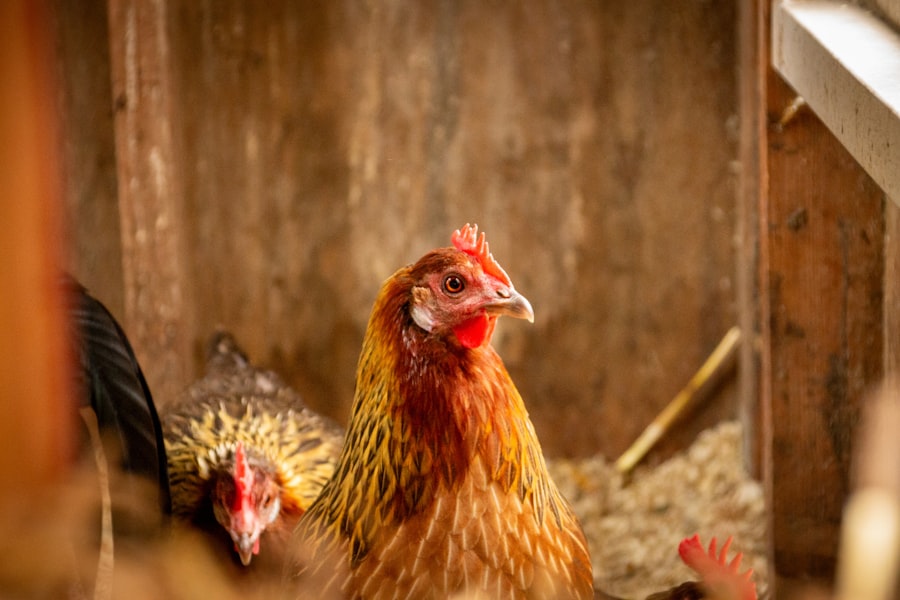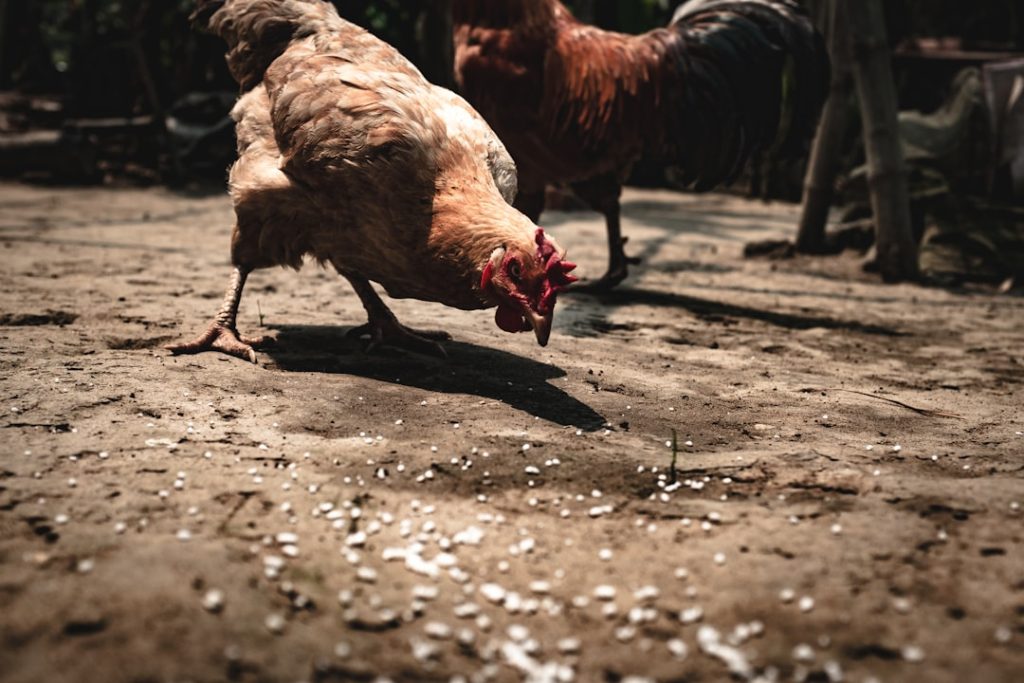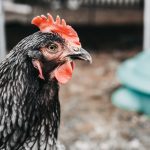When selecting chicken breeds for a garden, several factors should be considered:
Climate: Different breeds are adapted to various temperature ranges. Some are better suited for cold climates, while others thrive in warmer conditions. Space: The size of the garden and available roaming area is important.
Certain breeds are more suitable for free-ranging, while others adapt well to confined spaces. Purpose: Breeds vary in their primary uses, such as egg production, meat production, or as pets. It’s essential to choose a breed that aligns with the intended purpose.
Temperament: Chicken breeds have different personalities. Some are docile and friendly, while others may be more aggressive or flighty. This is particularly important when considering compatibility with children or other pets.
Popular garden chicken breeds include:
1. Rhode Island Red
2. Plymouth Rock
3.
Sussex
These breeds are known for their hardiness, good egg production, and friendly dispositions. For smaller gardens, bantam breeds like Silkies or Pekins are options. These are known for their attractive plumage and make good pets.
The ideal breed for a garden depends on specific needs and preferences. Thorough research is recommended to select a breed that will thrive in the given environment.
Table of Contents
- 1 Setting up a safe and comfortable coop
- 2 Providing proper nutrition and water
- 3 Ensuring adequate space for free-ranging
- 4 Protecting your garden from potential damage
- 5 Maintaining good hygiene and cleanliness
- 6 Monitoring and caring for the health of your chickens
- 7 FAQs
- 7.1 What are the benefits of keeping chickens in a UK garden?
- 7.2 What are the legal requirements for keeping chickens in a UK garden?
- 7.3 What do chickens need in terms of housing and space in a UK garden?
- 7.4 What do chickens eat and drink in a UK garden?
- 7.5 How do you keep chickens healthy in a UK garden?
- 7.6 What are some common predators of chickens in a UK garden?
Key Takeaways
- Consider the size and temperament of the breed when choosing chickens for your garden
- Provide a secure and predator-proof coop with proper ventilation and nesting boxes
- Offer a balanced diet of chicken feed, fresh greens, and clean water to keep your chickens healthy
- Allow at least 10 square feet of space per chicken for free-ranging and foraging
- Use fencing, barriers, and natural deterrents to protect your garden from chicken damage
- Regularly clean the coop, replace bedding, and keep feed and water containers clean
- Monitor for signs of illness, provide regular check-ups, and seek veterinary care when needed
Setting up a safe and comfortable coop
Protection and Ventilation
When setting up a coop for your chickens, it’s essential to provide protection from predators such as foxes, raccoons, and birds of prey. The coop should also be well-ventilated to prevent moisture buildup and allow for proper airflow. This will ensure a healthy environment for your chickens to thrive in.
Coop Design and Layout
The coop should be spacious enough to allow for roosting and nesting areas for your chickens. Consider using sturdy materials such as wood or metal to ensure durability and protection from predators. Make sure the coop is raised off the ground to prevent flooding and provide a dry environment for your chickens. Inside the coop, provide nesting boxes filled with clean bedding for your hens to lay their eggs. Additionally, provide roosting bars at varying heights to allow your chickens to perch comfortably at night.
Coop Placement and Maintenance
When deciding where to place the coop in your garden, choose a location that is well-drained and receives plenty of sunlight throughout the day. This will help keep the coop dry and provide a healthy environment for your chickens. Consider placing the coop near a water source for easy access to fresh water for your chickens. By setting up a safe and comfortable coop, you’ll provide your chickens with a secure and healthy environment to thrive in your garden.
Providing proper nutrition and water

Proper nutrition is essential for the health and well-being of your chickens in the garden. A balanced diet will ensure that your chickens lay high-quality eggs and maintain good overall health. A good quality commercial feed is a great base for their diet but supplementing with kitchen scraps or garden greens can also be beneficial.
It’s important to provide access to fresh water at all times as well. In addition to commercial feed, chickens can benefit from kitchen scraps such as vegetable peels, fruit scraps, and cooked grains. However, it’s important to avoid feeding them foods that are toxic to chickens such as avocado, chocolate, or raw beans.
Additionally, providing access to fresh greens from your garden can be beneficial for their overall health. It’s important to monitor their food intake and adjust accordingly based on their activity level and egg production. Providing proper nutrition will ensure that your chickens are healthy and productive in your garden.
Proper nutrition is essential for the health and well-being of your chickens in the garden. A balanced diet will ensure that your chickens lay high-quality eggs and maintain good overall health. A good quality commercial feed is a great base for their diet but supplementing with kitchen scraps or garden greens can also be beneficial.
It’s important to provide access to fresh water at all times as well. In addition to commercial feed, chickens can benefit from kitchen scraps such as vegetable peels, fruit scraps, and cooked grains. However, it’s important to avoid feeding them foods that are toxic to chickens such as avocado, chocolate, or raw beans.
Additionally, providing access to fresh greens from your garden can be beneficial for their overall health. It’s important to monitor their food intake and adjust accordingly based on their activity level and egg production. Providing proper nutrition will ensure that your chickens are healthy and productive in your garden.
Ensuring adequate space for free-ranging
If you plan on allowing your chickens to free-range in your garden, it’s important to ensure that they have adequate space to roam and forage. Free-ranging allows chickens to exhibit natural behaviors such as scratching and dust bathing while also providing them with access to a diverse range of insects and plants. When allowing chickens to free-range in your garden, it’s important to consider fencing off any areas where they could potentially cause damage such as vegetable patches or flower beds.
Additionally, providing them with access to shaded areas and dust bathing spots will help keep them comfortable while they roam. It’s also important to monitor their behavior while free-ranging to ensure they aren’t causing damage or getting into areas they shouldn’t be in. By providing adequate space for free-ranging in your garden, you’ll allow your chickens to exhibit natural behaviors while also benefiting from their pest control abilities.
If you plan on allowing your chickens to free-range in your garden, it’s important to ensure that they have adequate space to roam and forage. Free-ranging allows chickens to exhibit natural behaviors such as scratching and dust bathing while also providing them with access to a diverse range of insects and plants. When allowing chickens to free-range in your garden, it’s important to consider fencing off any areas where they could potentially cause damage such as vegetable patches or flower beds.
Additionally, providing them with access to shaded areas and dust bathing spots will help keep them comfortable while they roam. It’s also important to monitor their behavior while free-ranging to ensure they aren’t causing damage or getting into areas they shouldn’t be in. By providing adequate space for free-ranging in your garden, you’ll allow your chickens to exhibit natural behaviors while also benefiting from their pest control abilities.
Protecting your garden from potential damage
While chickens can be beneficial in the garden by providing pest control and fertilizing the soil with their droppings, they can also potentially cause damage if not managed properly. To protect your garden from potential damage caused by chickens, it’s important to set up barriers or fencing around sensitive areas such as vegetable patches or flower beds. Additionally, consider using chicken tractors or movable fencing systems that allow you to rotate their grazing areas throughout the garden.
This will help prevent overgrazing in one area while also allowing them access to fresh vegetation. It’s also important to monitor their behavior while free-ranging in the garden and intervene if they start causing damage. By taking proactive measures to protect your garden from potential damage caused by chickens, you’ll be able to enjoy the benefits of having them in your garden without sacrificing the health of your plants.
While chickens can be beneficial in the garden by providing pest control and fertilizing the soil with their droppings, they can also potentially cause damage if not managed properly. To protect your garden from potential damage caused by chickens, it’s important to set up barriers or fencing around sensitive areas such as vegetable patches or flower beds. Additionally, consider using chicken tractors or movable fencing systems that allow you to rotate their grazing areas throughout the garden.
This will help prevent overgrazing in one area while also allowing them access to fresh vegetation. It’s also important to monitor their behavior while free-ranging in the garden and intervene if they start causing damage. By taking proactive measures to protect your garden from potential damage caused by chickens, you’ll be able to enjoy the benefits of having them in your garden without sacrificing the health of your plants.
Maintaining good hygiene and cleanliness

Preventing Bacterial and Parasitic Buildup
Regularly cleaning out their coop and nesting boxes will help prevent the buildup of bacteria and parasites that can lead to illness in your flock. Additionally, providing access to dust bathing areas will help keep your chickens clean by allowing them to naturally rid themselves of parasites such as mites or lice.
Cleaning Waterers and Feeders
It’s also important to regularly clean their waterers and feeders to prevent contamination from bacteria or mold.
Creating a Healthy Environment
By maintaining good hygiene and cleanliness in your chicken coop and surrounding areas in the garden, you’ll create a healthy environment for your flock while also reducing the risk of disease transmission.
Monitoring and caring for the health of your chickens
Monitoring and caring for the health of your chickens is essential for ensuring their well-being in the garden. Regularly checking on them for signs of illness or injury will allow you to intervene early if necessary. Additionally, providing regular access to fresh water and ensuring they have a balanced diet will help maintain their overall health.
It’s also important to monitor their egg production as a decrease could indicate an underlying health issue. If you notice any signs of illness or injury in your flock, it’s important to seek veterinary care promptly. By monitoring and caring for the health of your chickens in the garden, you’ll ensure that they remain healthy and productive members of your household.
Monitoring and caring for the health of your chickens is essential for ensuring their well-being in the garden. Regularly checking on them for signs of illness or injury will allow you to intervene early if necessary. Additionally, providing regular access to fresh water and ensuring they have a balanced diet will help maintain their overall health.
It’s also important to monitor their egg production as a decrease could indicate an underlying health issue. If you notice any signs of illness or injury in your flock, it’s important to seek veterinary care promptly. By monitoring and caring for the health of your chickens in the garden, you’ll ensure that they remain healthy and productive members of your household.
If you’re interested in learning more about what vegetables quails eat, check out this informative article on Poultry Wizard. It provides valuable insights into the dietary needs of quails and how to ensure they are getting the right nutrition. This website is a great resource for all things poultry-related, including tips on keeping chickens in a UK garden and even information on whether quails sit on their eggs.
FAQs
What are the benefits of keeping chickens in a UK garden?
Keeping chickens in a UK garden can provide a sustainable source of fresh eggs, natural pest control, and fertilizer for the garden. Chickens also make great pets and can help reduce stress and anxiety.
What are the legal requirements for keeping chickens in a UK garden?
In the UK, there are regulations regarding the number of chickens you can keep, the type of housing they require, and biosecurity measures to prevent the spread of diseases. It is important to check with your local council for specific regulations in your area.
What do chickens need in terms of housing and space in a UK garden?
Chickens need a secure coop for roosting and laying eggs, as well as a run for exercise and access to fresh air. The coop should provide protection from predators and the elements, and each chicken should have at least 1-2 square meters of space in the run.
What do chickens eat and drink in a UK garden?
Chickens require a balanced diet of layer pellets or mash, supplemented with fresh fruits, vegetables, and occasional treats like mealworms. They also need access to clean water at all times.
How do you keep chickens healthy in a UK garden?
To keep chickens healthy in a UK garden, it is important to provide regular access to fresh water, a balanced diet, and regular health checks. Good hygiene practices, such as cleaning the coop and run regularly, can also help prevent the spread of diseases. It is also recommended to vaccinate chickens against common diseases.
What are some common predators of chickens in a UK garden?
Common predators of chickens in a UK garden include foxes, rats, stoats, and birds of prey. It is important to secure the coop and run with strong fencing and locks to protect the chickens from these predators.
Meet Walter, the feathered-friend fanatic of Florida! Nestled in the sunshine state, Walter struts through life with his feathered companions, clucking his way to happiness. With a coop that’s fancier than a five-star hotel, he’s the Don Juan of the chicken world. When he’s not teaching his hens to do the cha-cha, you’ll find him in a heated debate with his prized rooster, Sir Clucks-a-Lot. Walter’s poultry passion is no yolk; he’s the sunny-side-up guy you never knew you needed in your flock of friends!







